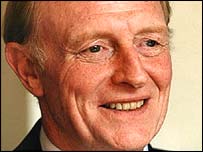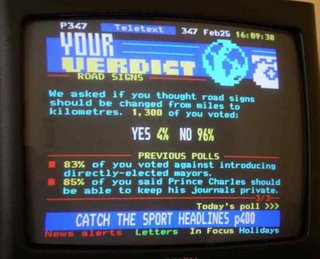No-one was more pleasantly surprised than the British Weights and Measures Association, Customary Measures Society and Active Resistance to Metrication recently when a spate of public opinion polls delivered the death knell to the metrication lobby. All the more so since their own polls had suggested support for Imperial weights and measures was running at about 76%; the recent polls were showing nearly 90% or 100% against metric in a development akin to the French and Dutch rejection of the EU constitution and Neil Herron's North East No Campaign's defeat of deputy Prime Minister John Prescott's proposed North East Euro Region elected assembly.
 Lord Kinnock
Lord Kinnock
The whole thing blew up when Lord Kinnock, former campaigner for the abolition of the House of Lords and withdrawal from the EU and now also a former member of the Living Dead brotherhood of failed politicians whose twilight existence takes the form of the European Commission, and Lord Howe, patron of the UK Metric Association (UKMA), suggested Britain should metricate in time for the 2012 London Olympics. Presumably their argument was based on the need for foreign competitors to find their way around the various venues. Not that this would have altered the outcome, as most medals are won by our American cousins, who are steadfastly Imperial.
Never has a planned media campaign backfired so spectacularly, although following a discredited UKMA media campaign previously, we should not be surprised in this respect.
So how is this significant for archivists? Well, clearly we are concerned about the Olympics diverting funds from the Heritage Lottery Fund but equally we are committed to preserving cultural heritage, of which Imperial weights and measures form part; also we must ensure the correct interpretation of cultural heritage, for example in describing documents' dimensions in Imperial rather than metric units. Failure to comply with this ethic amounts to falsification and anachronism. In any case surely we can expect intelligent users of archives to understand Imperial, can't we? After all, Imperial is named after the Roman Empire, thus giving other Europeans a cultural affinity with Britain (remember how we were supposed to embrace the European Single Currency because it was supposedly anciently preceded by the single currency of the Roman Empire?!)
Against this background we continue to marvel at the policy of metrification adopted by the UK National Archives. We know of no act of Parliament that compels us to metricate at all, let alone metricate our cultural heritage. Indeed, the Civil Service's own system of weights and measures is a compound system of decimal and Imperial units; The EU's system of weights and measures is also compound rather than metric or decimal (units such as units of time, kilometres per hour, kilowatt hours and joules, contained in both, are either Imperial or compound, not metric or decimal.) It would be useful to know to which system TNA is conforming.
Alarmingly for a supposedly democratic society, TNA is certainly not conforming to the preferences of the British public, as confirmed by the recent opinion polls.

The Teletext Result
So what did the opinion polls say?
The Metro: 79% pro mile
BBC News 86% keep the mile
BBC North West 97% keep the mile
AOL News: 30,000 voted, 82.5% pro-mile, 17.5% pro-kilometre
ITV Teletext p. 347: 1,300 voted 96% pro-mile, 4% pro-kilometre
‘This Morning’ poll 97% pro-mile, 3% pro-kilometre
Daily Express poll, overwhelming support for the mile, said to be 95%-plus
Sky News poll, again overwhelming support for the mile, no precise figures given out
ICM 86% keep the mile
Meanwhile in Brussels, Gunter Verheugen, Commissioner for Enterprise and Industry, said: I am not pressuring the UK to go metric. As long as I am in Brussels, I will not touch the issue. Full stop. I personally have a lot of sympathy for the mile and for the pint in the UK. What is the problem here for the internal market? Really, what is the problem?
UK Government minsters took the same line during the debate on the UKMA proposal.
So far out on a limb, we can only conclude the metropolitan elite, not known for their being in touch, somehow deduced the country was drifting towards metrification.
They deduced wrongly. Senior TNA staff, gearing up to assist the Audit Office in accreditation of archive services, are known to enquire if archivists act on public feedback. SQA will of course observe TNA's own responsiveness to public opinion with interest.
 Lord Kinnock
Lord KinnockThe whole thing blew up when Lord Kinnock, former campaigner for the abolition of the House of Lords and withdrawal from the EU and now also a former member of the Living Dead brotherhood of failed politicians whose twilight existence takes the form of the European Commission, and Lord Howe, patron of the UK Metric Association (UKMA), suggested Britain should metricate in time for the 2012 London Olympics. Presumably their argument was based on the need for foreign competitors to find their way around the various venues. Not that this would have altered the outcome, as most medals are won by our American cousins, who are steadfastly Imperial.
Never has a planned media campaign backfired so spectacularly, although following a discredited UKMA media campaign previously, we should not be surprised in this respect.
So how is this significant for archivists? Well, clearly we are concerned about the Olympics diverting funds from the Heritage Lottery Fund but equally we are committed to preserving cultural heritage, of which Imperial weights and measures form part; also we must ensure the correct interpretation of cultural heritage, for example in describing documents' dimensions in Imperial rather than metric units. Failure to comply with this ethic amounts to falsification and anachronism. In any case surely we can expect intelligent users of archives to understand Imperial, can't we? After all, Imperial is named after the Roman Empire, thus giving other Europeans a cultural affinity with Britain (remember how we were supposed to embrace the European Single Currency because it was supposedly anciently preceded by the single currency of the Roman Empire?!)
Against this background we continue to marvel at the policy of metrification adopted by the UK National Archives. We know of no act of Parliament that compels us to metricate at all, let alone metricate our cultural heritage. Indeed, the Civil Service's own system of weights and measures is a compound system of decimal and Imperial units; The EU's system of weights and measures is also compound rather than metric or decimal (units such as units of time, kilometres per hour, kilowatt hours and joules, contained in both, are either Imperial or compound, not metric or decimal.) It would be useful to know to which system TNA is conforming.
Alarmingly for a supposedly democratic society, TNA is certainly not conforming to the preferences of the British public, as confirmed by the recent opinion polls.

The Teletext Result
So what did the opinion polls say?
The Metro: 79% pro mile
BBC News 86% keep the mile
BBC North West 97% keep the mile
AOL News: 30,000 voted, 82.5% pro-mile, 17.5% pro-kilometre
ITV Teletext p. 347: 1,300 voted 96% pro-mile, 4% pro-kilometre
‘This Morning’ poll 97% pro-mile, 3% pro-kilometre
Daily Express poll, overwhelming support for the mile, said to be 95%-plus
Sky News poll, again overwhelming support for the mile, no precise figures given out
ICM 86% keep the mile
Meanwhile in Brussels, Gunter Verheugen, Commissioner for Enterprise and Industry, said: I am not pressuring the UK to go metric. As long as I am in Brussels, I will not touch the issue. Full stop. I personally have a lot of sympathy for the mile and for the pint in the UK. What is the problem here for the internal market? Really, what is the problem?
UK Government minsters took the same line during the debate on the UKMA proposal.
So far out on a limb, we can only conclude the metropolitan elite, not known for their being in touch, somehow deduced the country was drifting towards metrification.
They deduced wrongly. Senior TNA staff, gearing up to assist the Audit Office in accreditation of archive services, are known to enquire if archivists act on public feedback. SQA will of course observe TNA's own responsiveness to public opinion with interest.
Comments
Post a Comment